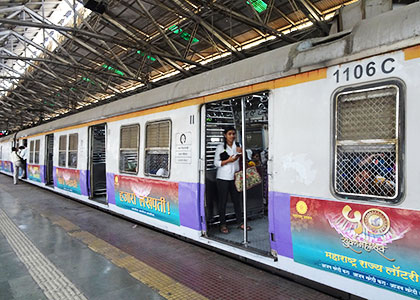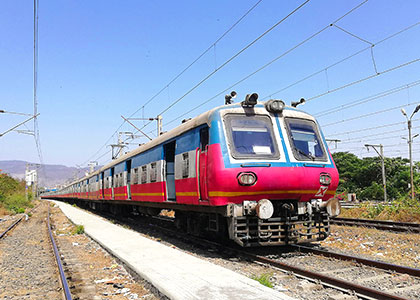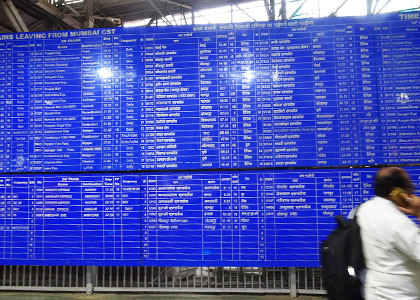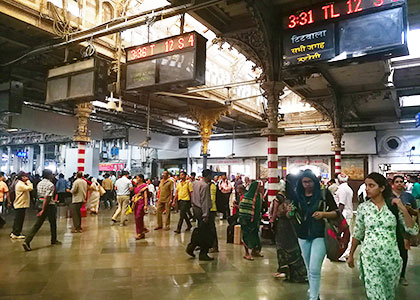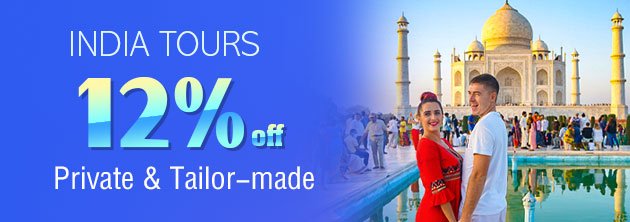Mumbai Local Trains: Timetable, Train Routes and Tickets
Mumbai, the city of dreams, entertainment and glamour, is apparently also the city that never sleeps. The lifeline of the commercial capital of the country is ultimately, the local trains. Before the wee hours of dawn and even during the sleeping hours of the city, Mumbai local trains incessantly serve as the most convenient, affordable, and fastest means of commutation.Geographically, the city extensively covers a stretch of 603 square kilometers. And, to manage and coordinate more than two crore people of the city in terms of railway transport is a daunting task. To connect every corner of and around the city with a definite and systematic alignment, the railway routes have been bifurcated into three lines - The Western Line, The Central Line, and The Harbor Line.
|
|
|
Mumbai Local Train Routes
• Western Line:
The western line of the Mumbai Local trains connects the semi-urban and rustic areas to the highly sophisticated edge of the city. The starting point is Dahanu, which is situated out of the city and almost nudges the Maharashtra-Gujarat border, the intermediate point is Virar and the end-point is Churchgate. However, the majority of the trains function between Virar and Churchgate which covers a journey of 60 kilometres.The AC trains distinctly trail from Virar to Churchgate at less frequent intervals than local trains. The major stops in Western line are Virar, Vasai, Borivali, Andheri, Bandra, Dadar, Bombay Central, and Churchgate. Just when the train is about to reach the Churchgate station, one can have a quick glance of the sea via Marine Drive.
• The Central Line:
The central line connects the other half of the city from Chhatrapati Shivaji Maharaj Terminus (CSMT) to various points of the city which are Kasara, Karjat, Khopoli, and Kalyan. There are 3 major branches to bridge the different corners on the central line. The main central line runs from Chhatrapati Shivaji Terminus to Kalyan. It is further subdivided into two passageways - the north-east line and the south-east line.
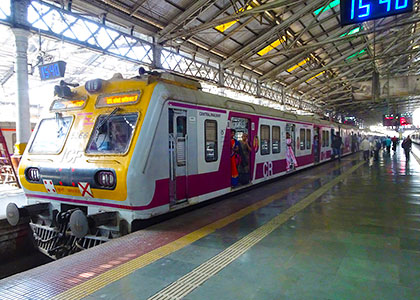
Train of Chhatrapati Shivaji Terminus
|
• Harbour Line:
The harbour line catered from the Central Line connects the network of the city from Chhatrapati Shivaji Terminus to Panvel which is a journey of 68 kilometres, on one side and Andheri and Goregaon towards the other side which enters the Western line. The Harbour Line adroitly functions by two routes: Wadala Road - Panvel and Wadala Road - Andheri - Goregaon and Borivali. The trains running in the line are slow and halt at every step. Also, Thane from the Central Line has connecting trains to stops in the Harbour line which are Nerul, Vashi and Panvel.The main commuting hub of the city is Dadar, which has connectivity to all three lines.
Mumbai Local Trains Timetable
The Mumbai local trains efficiently start a journey from the starting point and there is a fixed time limit to reach the destination. The trains function tirelessly from 3:25 am to about 2:30 am. The last train leaves all the platforms by a maximum of 1 o’clock at night. From some major stations, local trains start at 4:00 am in the morning.Mumbai Local Train Tickets
The best part about the Mumbai local trains is the affordability, which one can attain by standing in long queues at the ticket window or by having a train pass or by using the smart card. To avoid the heavy inconvenience of long queues and of taking a ticket on a routine basis, regular commuters prefer the pass system. The pass can be used on a timely basis - monthly, three months, six months, and also annually. There is also a tourist pass which can be availed for a day or a week, which is valid for transport throughout the whole of Mumbai and in all the three lines for the limited time.
|
|
|
The state government also provides special privileges to school students and college students in terms of fare concession for their monthly or quarterly pass for both first and second class. Further, there are additional reservations for girls. A monthly second class pass for girls is free of cost.
Nowadays, with the advancement in technology and the advent of the internet, the Mumbai railways have made an initiative to level the pace. So, the tickets can be booked online with the help of the UTS (Unreserved Ticketing System) application.
Mumbai Train Coaches
The train coaches are methodically partitioned into 12 or 15 coaches and the length of the platforms for various stations are constructed according to the 12 or 15 coach based train arriving on them. Further, the coaches are segregated into exclusive categories - ladies, handicapped, senior citizens and cancer patients, and general. Additionally, there is one first-class coach for ladies and three first-class coaches for general. With respect to the pace of the train, for the convenience in transport for everyday commuters, there are two types of trains and stations based on the commercial and popularity-based framework of the city - fast and slow. There are a number of inter-linking dots among the three lines at various major stations which increases the complexity and confusion. Most of the inter-linking stops are the stops where only fast trains halt.
You May Like:
Delhi to Mumbai by Air and Train
Mumbai to Lonavala: Bus VS Train VS Taxi
Mumbai to Nashik: The Fastest and Cheapest Ways to Go

